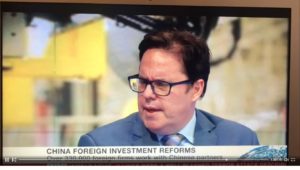
Foreign companies have been struggling how to manage their China investments for decades. Veteran China lawyer Mark Schaub, partner at KWM, looks at how the questions have remained, but the answers changed as China developed from a lucrative niche market into a major competitor for most industries, in his weekly Chit-Chat China.
Mark Schaub:
Thirty years ago, China was for most foreign companies a lucrative niche market with great potential but of limited sophistication. Today for many of these foreign companies China is a critical market that is increasingly complicated, regulated and above all, competitive. Thirty years ago, foreign business interaction with China was often simply sourcing or manufacturing for export or B2B (e.g. auto suppliers for VW, selling to China manufacturing etc.).
Back in those days there were many challenges – unclear regulations, IP protection, increasing labour costs, real estate issues etc. Today, I imagine for almost every business in China the number one challenge is COMPETITION – competition for market share, for talent, for opportunities.
While there will be risks, perhaps sourcing companies or B2B businesses can still be remotely managed to a large degree but this is far more difficult for consumer facing businesses or larger businesses.
Today’s China requires greater agility than in the 1990s – management needs to respond to competition, regulatory change and market trends – to be fair it has probably been sub-optimal for a decade to remotely micro-manage China operations from the USA or Europe. The impact of COVID could mean a business limping along sub-optimally may not survive.
In China, anything good will be snapped up quickly.
One client, a retailer of homeware, very successful internationally, attractive product range, homeware was a hot sector, product was competitively priced… what could go wrong? Well for one thing … real estate could go very wrong and they had a bricks and mortar model. Securing leases was crucial to the business but the European HQ was wary of perceived risks in doing business in China.
To combat this the European management came up with a very well thought out protocol to be followed when entering into a lease as illustrated below:
The HQ protocol was excellent at minimizing risk – in large part this was due to almost no leases being signed. Only the most desperate of landlords would have the patience to wait for the whole laborious and time-consuming process to unfold. Most leases were for basement space in non-performing malls. This killed the business in China.
Mark Schaub is a speaker at the China Speakers Bureau. Do you need him at your (online) meeting or conference? Do get in touch or fill in our speakers’ request form.
Are you looking for more stories by Mark Schaub? Do check out this list.

No comments:
Post a Comment